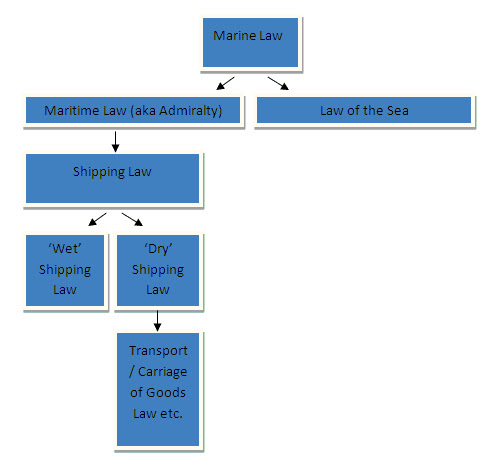There are many terms to describe the law of ships and shipping; some of which have broad, and others quite specific, meanings. A brief guide to the correct uses and distinctions follows:
Admiralty – Traditionally ‘admiralty law’ referred only to contractual and tortious disputes arising from the operations of ships (named after the typical work of the Admiralty Court in England). It would not, for instance, cover governmental or international shipping regulations. However, the description has become more loosely used over time and today it is interchangeable with ‘Maritime Law’ as a term describing all law related to ships.
Boating Law – This is a US term, which essentially means the same as ‘admiralty law’, although it is often used to describe smaller level admiralty law (yacht fees, radio requirements etc.).
Carriage of Goods Law – This specifically relates to the law of moving cargo. It is not restricted to marine cargo (unless referred to as ‘Carriage of Goods by Sea Law’) and will cover goods being moved by sea, road, rail, air and multimodal (by more than one means).
Maritime Law – Describes all law related to ships and shipping; including the building, navigation, crewing, operation and other activities and incidents related to ships. Although now used interchangeably with the term ‘Admiralty Law’, Maritime Law is preferable as the more common term.
Shipping Law – This is perhaps the best term to describe the law relating to ships. Shipping law covers the building and operation of ships and is split into two categories: wet and dry. ‘Wet’ shipping law involves things happening on water, like ships sinking, colliding with other ships or objects and other casualties at sea. ‘Dry’ shipping law refers to things happening on paper like disputes about charterparty clauses or shipbuilding contracts. Many lawyers who deal with wet shipping matters only consider that dry shipping disputes can be boring as they are not linked to any real wolrd event.

